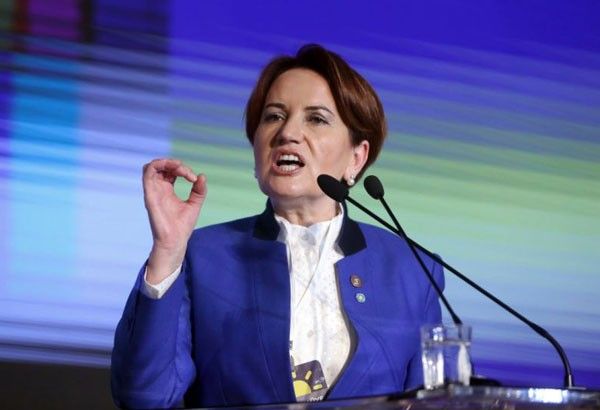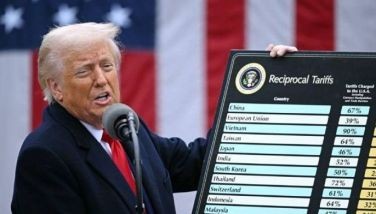Turkey's weak opposition scrambles to challenge Erdogan

ANKARA — One party leader is in jail. Another doesn't have a candidate. A third might face eligibility issues for her party. Turkey's weak opposition is scrambling to mount a meaningful challenge against strongman President Recep Tayyip Erdogan with just nine weeks to prepare for snap elections.
Erdogan set the presidential and parliamentary elections for June 24, in a move that will usher in a new system cementing the president's grip on power more than a year ahead of schedule. Turkey is switching from a parliamentary system to an executive presidential system after a narrowly approved referendum last year, in the wake of a failed 2016 coup attempt. The changes take effect with the next election, which had originally been set for November 2019.
The snap elections caught Turkey off guard and come as the opposition is in disarray. Recent changes to the electoral law pushed through by Erdogan's governing AKP party with the help of the nationalist party make the playing field even more uneven for the opposition, analysts say.
Still, the opposition parties sounded upbeat with the main opposition party's leader, Kemal Kilicdaroglu, promising that the June elections would bring "democracy" and "calm," and Meral Aksener, seen as the strongest candidate against Erdogan, vowing to send him home to rest after 15 years in power.
Observers say the early elections were called to capitalize on nationalist sentiment running high following a successful military campaign in Syria that ousted Syrian Kurdish militia from a border region, in a decision fueled by fears of an economic downturn ahead.
"The fact that President Erdogan called early elections, which is the first time he had voluntarily done so since he assumed office ... is an indication of panic and worry," said Fadi Hakura, of the Chatham House think tank.
The changes, which include ballot boxes being supervised by government-appointed civil servants and being relocated at will on security grounds, "make it improbable for the opposition to win any general election in Turkey," Hakura said. "These really serious changes to the election law will, I think, make any serious challenge by the opposition highly improbable."
The call for an early vote also follows the sale of Turkey's largest media group, Dogan Holding, to a group close to Erdogan, further strengthening his grip on the country's media.
A day after the snap election was called, the pro-Erdogan press seemed confident of the vote's outcome. "Checkmate" headlined the pro-Erdogan newspaper Yeni Safak on yesterday, suggesting an early victory for Erdogan.
Deputy Prime Minister Bekir Bozdag compared the opposition to people "caught in a downpour in August, without an umbrella." Marhir Unal, a senior member of Erdogan's ruling party, said the latest opinion polls give Erdogan 55.6 percent support — which would allow him to win the presidential election in the first round. But Unal didn't provide further details about the polls.
The main opposition party, the pro-secular Republican People's Party has yet to announce its candidate. Its leader, Kilicdaroglu, on yesterday didn't rule out an alliance with parties "that support democracy and oppose a one-man regime."
The party denied it has been caught by surprise, saying it has several strong candidates and will nominate one in the next two weeks.
But the person considered the most serious contender against Erdogan so far is Aksener, a popular former interior minister who defected from Turkey's main nationalists and formed her own party.
She has already announced her candidacy for the presidential race. However, questions surround the eligibility of her newly-founded Iyi (Good) Party for the parliamentary vote, as the party is legally required to have completed its general congress six months before the elections — something made impossible by Erdogan calling the elections for June.
"No one is strong enough to keep us out of the elections," Aksener said during a rally in the southern Turkish town of Fethiye on yesterday.
The party in the most precarious situation is the country's pro-Kurdish party, whose 45-year-old popular and charismatic former leader, Selahattin Demirtas, is in prison accused of links to outlawed Kurdish rebels. He faces a 142-year sentence on charges of leading a terror organization, engaging in terror propaganda and other crimes.
Demirtas, who has been behind bars since November 2016, stepped down as co-chair of his People's Democratic Party, or HDP. He ran against Erdogan in Turkey's first direct presidential election in 2014 and led his party to parliament in two general elections in 2015. The party's current co-chairs, Pervin Buldan and Sezai Temelli, lack his popular appeal.
The elections would be held under a state of emergency declared following the failed coup. Parliament on Wednesday extended it for a seventh time despite calls for its end. Critics say the government has used the emergency powers to close down media outlets and jail critics.
- Latest
- Trending





























